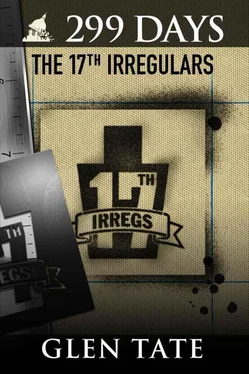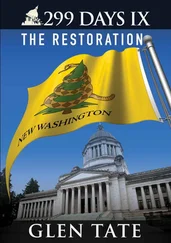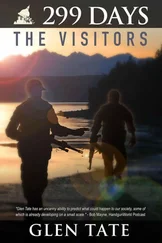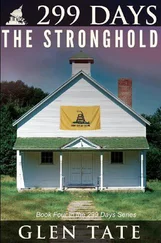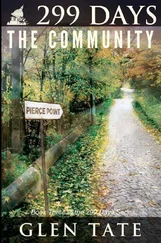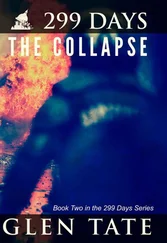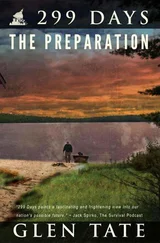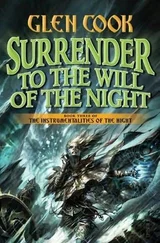Hammond went back up to the podium and shook his head, “Ain’t gonna happen.” He looked out at the audience again and said, “Repo America? Are you kidding me? They ain’t getting’ in boats and comin’ here. So what does that mean? It means the FCards will start to go dry soon, just like the EBT cards went dry.”
“No more FCards,” Hammond said. “Soon. About six months, tops, according to our intel analysts. And, believe me, we have some highly placed sources on that.”
“What happens then?” Hammond asked the audience. “You know. You know exactly what happens then. You’ve seen what happens when the shelves go bare. You saw it on May Day, but this time there won’t be any FCards and commandeered semis to roll in and save the day.”
Hammond put up his hands for emphasis and said, “You think the May Day riots were bad? You ain’t seen nothin’ yet. You know, we’ve had semi-functioning government services up until now. And, to be very honest, this is not how the collapse scenario was expected to play out.”
“Everyone,” Hammond said, pointing to himself, “including me, assumed the ‘Mad Max’ scenario of total anarchy and chaos. Like in the book ‘Patriots.’ Well, it was a slower descent than we thought. A car wreck in slow motion, not at full speed, but a car wreck just the same. It took a matter of months, not days, but the ultimate result is the same. When the FCards dry up, everything that resembles order goes away.” Hammond snapped his fingers for emphasis. The snapping was loud enough for everyone in the whole hall to hear it.
“The utilities, which are still on, to my surprise, can’t stay on when there’s nothing to feed the utility workers,” Hammond continued. “What’s going to happen when the electricity goes off for good? How will people react when there is no water coming out of the faucet?”
Once again, Hammond let all of this sink in. “So, no food and no utilities. How many people are in this country? Three hundred million, right? Most of them will die. Two hundred million dead, and then some. I’ll say that again: 200 million dead. Rotting corpses will be everywhere. I’ve seen it elsewhere in the world. I’m going to see it here, too.”
The audience was horrified.
Hammond paused and raised his hand with his index finger pointed up, and said, “Unless.”
“Unless,” Hammond repeated. “Unless they’re stopped. Unless we push them aside and start getting this place back on its feet. You see, we know how to get people fed, how to let them grow their own food and trade. Without gangs and the government stealing from them. Unleash the private sector, actual free enterprise, not what we have now, and people will feed themselves, like they’ve done for thousands of years in places much less hospitable to growing food than here. This country has the best agricultural land and other natural resources in the history of mankind. We fed ourselves—and a big chunk of the rest of the world—up until just a few years ago. Are you telling me we can’t do that again? What the hell else are they going to do back in Iowa? Grow daisies?”
“Yeah,” Hammond said, nodding, “it’ll be a rough winter and lots of people will die. The Limas have done so much damage to this country that we can’t wave a magic wand and make things instantly right. But you know that. The fact that you’re here in this room means that you know that there is no magic wand. You would have waved that first before you committed yourself to joining a rebel army.”
“So,” Hammond said, “that’s reason number two why you’re doing this: you know that at least 200 million people will die unless the Limas are stopped. And, because you’re a decent human being, you can’t sit back and watch that. Little kids dying of starvation. Can you just watch that and not do something? I’ve seen little kids starve to death in other places. There is no way to sit there and not do something. No possible way. And, if 200 million out of 300 million will die, what makes you think you’ll be one of the minority who makes it? What makes you think your family will, too? If there is a two-thirds odds of you dying, add in a wife and the odds of you two making it go down further. Throw in a kid and you’re even lower. The sheer odds of you and your family making it are, what, ten percent? You gonna bet on that?”
Hammond scribbled something on the file in front of him. It seemed like too serious of a moment to scribble something. Then he pointed to the captain, “Quick, Morris, pick a number between one and ten.”
“Two, sir,” Captain Morris said.
Hammond held up the file folder, which had a big “eight” written on it.
“Your family is dead,” Hammond said. “You didn’t make it into the ten percent club.”
Hammond looked back at the audience and said, “Only a fool will bet on making it by just sitting back and letting other people take care of them and their family. The Limas have such a brilliant track record of taking care of people, don’t they? Anyone with any sense will take care of themselves and the ones they love.”
“Well,” Hammond said, throwing his hands up, “how you gonna do that? By voting? Elections have been cancelled, and electing the lesser of two evils is what got us where we’re at right now. Elections will not save you. It’s too late for that. If you thought elections would work anymore, you’d be in a room tonight for a new political party. You’re not. You’re in a room tonight for a rebel army.”
“Nope,” Hammond said, “you’re not going to look to elections to save us. You’re going to drive off the animals attacking you. You’re going to push and then—bam!—the tipsy government that is barely holding on will fall over and shatter into a million pieces. You’ll be amazed at how tipsy it was. You’ll look back and say, ‘It looked so solid, but fell so easily.’ And you’ll be right.”
“So we already have three good reasons why you’re doing this,” Hammond said, putting up three fingers. “One,” he said holding up one finger, “You know you’re supposed to be doing this.
“Two,” Hammond said, holding up two fingers, “we’re going to win. The Limas are weak.”
“Third,” he said, holding up three fingers, “you can’t sit back and watch most of your country starve to death, including—odds are—your own family.”
“Oh, but there’s more,” Hammond said, holding up a fourth finger. “How about this? Your place in history. Now, it’s hard for people to think about how they’ll be viewed in the future. Fair enough. So look back at how you view people in the past. You see, every couple generations or so, Americans have to do big and nasty things, but then the country, and sometimes the whole world, thanks them. I’ll give you an example. My granddaddy was in World War II. He was a war hero, actually. The rest of his life he was respected and honored. Before him, were my ancestors who fought in the Civil War or, as I’m now coming to realize, the War Between the States. There was heroism on both sides of that one. One of them saved a family from a fire started by enemy troops. Then there’s the Revolutionary War, which is the best example of what’s happening now.”
“If just a handful of men and women,” Hammond said, “had decided to take it easy during in the Revolutionary War, there never would have been an America. How many people can say they did something that made life immeasurably better for millions of people for hundreds of years? That’s no exaggeration. Think about that, people.”
Hammond let that sink in. “Well, congratulations,” he said loudly. “That’s you. That’s you,” he said pointing to the audience, “and you and you and you.”
“So,” he continued, “to summarize—for you to remember when you’re cold, hungry, scared, and wondering if we’ll really win—here are the four reasons why we’re doing this. One, you’re supposed to do this. Two, we’re going to win. Three, you and probably over 200 million Americans are dead if we don’t do this. And, four, you will be part of history. Four damned good reasons to do this. Now let’s get to work.”
Читать дальше
